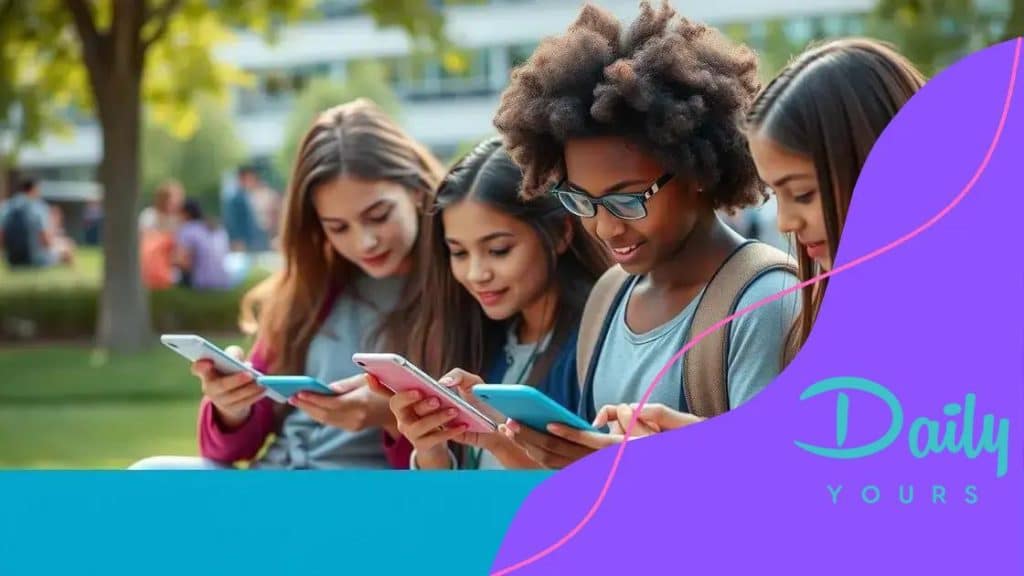Mobile apps as tools for extended learning beyond the classroom

Anúncios
Mobile apps as tools for extended learning offer flexibility, accessibility, and engaging features that enhance study routines and improve knowledge retention for learners of all ages.
Mobile apps as tools for extended learning beyond the classroom offer exciting opportunities for students to enhance their education. Have you thought about how these applications can transform your study habits, providing access to knowledge anytime and anywhere? Let’s dive into the potential of these tools.
Anúncios
Benefits of mobile apps for learning
Mobile apps have become essential tools in education, offering a range of benefits that enhance the learning experience. These applications provide convenience, accessibility, and innovative ways to engage with educational content.
Convenience and Accessibility
With mobile apps, students can learn anytime and anywhere. Imagine having access to a wealth of knowledge right in your pocket! This flexibility allows for learning on the go, making it easier to fit education into busy schedules.
Enhanced Engagement
Mobile apps often incorporate interactive features that keep learners interested. Gamified elements, quizzes, and community forums make studying more enjoyable. Here are some key features that boost engagement:
Anúncios
- Interactive content to keep students motivated
- Push notifications for reminders and updates
- Social sharing options to foster collaboration
- Personalized learning experiences based on preferences
These tools can transform traditional learning methods. In addition to engagement, they help deliver tailored content that matches each student’s pace and style.
Moreover, mobile apps often include tracking features that allow students to monitor their progress. This data-driven approach ensures learners can identify their strengths and areas for improvement.
Access to Diverse Resources
Another significant benefit of mobile apps is the vast range of resources available. From video tutorials to e-books, students can explore various materials that cater to their specific needs.
Utilizing mobile apps not only improves learning outcomes but also prepares students for a tech-savvy world. By embracing these tools early, learners develop skills essential for future success.
Top educational apps to consider
When it comes to enhancing your learning journey, choosing the right mobile apps is crucial. Several educational apps stand out for their ability to deliver content effectively and engage users. Here are some popular options that can make your learning experience more enjoyable.
Khan Academy
Khan Academy offers a wide range of subjects, from math to science. The platform provides interactive exercises and instructional videos to help students grasp complex topics. Users appreciate its flexible learning paths, allowing them to study at their own pace.
Duolingo
If you’re looking to learn a new language, Duolingo is a great choice. Its game-like structure makes learning fun. With daily exercises and instant feedback, learners can easily practice and improve their skills.
- User-friendly interface
- Multiple languages available
- Fun, competitive learning
Additionally, Duolingo keeps learners motivated by tracking their progress and providing rewards.
Quizlet
Quizlet helps students memorize concepts using flashcards and quizzes. It is particularly useful for preparing for exams or learning new vocabulary. The app enables users to create or use existing study sets, making it customizable.
Another excellent app is Coursera, which partners with top universities to provide online courses. With a variety of subjects, students can enhance their knowledge and even earn certificates. Learning becomes less intimidating when you have the resources that suit your learning style.
Edmodo
Edmodo connects educators and students in a secure environment. It facilitates communication, allows for assignment submissions, and offers a platform for collaboration. Teachers can share resources that enrich the learning experience.
These apps illustrate the diversity of available educational tools. Depending on your needs, you can explore many options that cater to different subjects and learning styles.
How to choose the right app for your needs

Choosing the right mobile app for your needs can greatly enhance your learning experience. With so many options available, it’s important to consider a few key factors before making your selection. You want to ensure that the app meets your specific learning goals and fits well into your lifestyle.
Identify Your Learning Style
First, think about how you learn best. Do you prefer video tutorials, interactive quizzes, or reading materials? Identifying your learning style can help narrow down your choices significantly. For example, if you’re a visual learner, an app with strong visual content may be more effective for you.
Look for User Reviews
Next, check for user reviews and ratings. These can provide insights into how effective the app is from others’ experiences. High ratings and positive feedback often indicate that the app delivers on its promises. On the other hand, look out for consistent complaints in the reviews, which may signal potential issues.
- Read comments on app stores and educational forums.
- Pay attention to user experiences regarding content quality.
- Look for any common problems reported by users.
Consider the app’s specific features, such as offline access and progress tracking. These elements can provide added convenience and enhance your study habits.
Set a Budget
Budget is another important factor. Many educational apps are free or offer a trial period, but some may require a subscription. Determine how much you’re willing to spend before exploring your options. Some premium apps may provide extensive resources worth the price, while others offer essential features without costs.
Once you establish a budget, you can effectively prioritize your choices. Make sure to take advantage of free trials whenever possible to test how well the app aligns with your needs. This way, you can explore its functionality and ensure it fits your learning goals.
Integrating apps into your study routine
Integrating mobile apps into your study routine can greatly enhance how you learn and retain information. This process involves making apps a regular part of your daily habits, which can lead to more effective study sessions.
Set Clear Objectives
Begin by setting clear objectives for your study sessions. What do you want to achieve? Are you looking to reinforce your knowledge in a specific subject or prepare for an exam? Having defined goals will help you select the right apps that align with your needs.
Schedule Dedicated Study Time
It’s essential to schedule dedicated time for your studies. Use a planner or calendar app to carve out specific blocks of time for studying. During these periods, focus exclusively on learning and avoid distractions. If you use educational apps, have them ready to go during these sessions.
- Choose apps that suit your study goals.
- Limit multitasking to enhance focus.
- Utilize reminders for app-related tasks.
If you prefer interactive learning, consider incorporating gamified apps into your routine. This can make studying more enjoyable while still being productive. Additionally, rotating between different apps can help keep the study sessions fresh and engaging.
Track Your Progress
Tracking your progress is crucial as you integrate apps into your routine. Many educational apps offer built-in tracking features that can show how much you have learned over time. This feedback encourages motivation by providing tangible proof of your growth.
Regularly reviewing your progress also helps identify areas you may need to focus more on. This tailored approach to studying allows you to use your time effectively and efficiently. By incorporating interactive features and feedback mechanisms, you can enhance your learning outcomes.
Case studies of successful app usage
Case studies of successful app usage provide valuable insights into how mobile applications can enhance learning experiences. These examples showcase the potential impact of educational apps when integrated effectively into study routines.
Study Case: Duolingo
Duolingo has changed the way individuals learn languages. Through its engaging style, users can practice vocabulary and grammar in a fun and interactive way. Successful users often report that they practice for just a few minutes each day. This approach makes language learning more manageable and less overwhelming.
Study Case: Khan Academy
Khan Academy has also shown remarkable success, especially among high school students preparing for exams. With its comprehensive library of video lessons and practice questions, students can reinforce their understanding of complex subjects like math and science. Many users appreciate how they can go back to review difficult topics anytime.
- Provides personalized learning paths.
- Available for free, making it accessible to all.
- Encourages active learning through quizzes.
Students have reported that incorporating Khan Academy into their study sessions has significantly improved their grades.
Study Case: Quizlet
Another successful instance can be seen with Quizlet, an app designed to help students memorize and retain information using flashcards. Teachers and students frequently use this tool to create study sets tailored to their course material. The interactive features help make learning more engaging, and the ability to share study sets fosters collaboration among peers.
Users often find that using Quizlet leads to improved retention rates and better performance on tests. By providing a platform where students can actively engage with the content, it creates a more dynamic learning environment.
These case studies illustrate how varied approaches can lead to effective learning outcomes. By leveraging the unique features of different apps, students can find solutions that work best for them and achieve their educational goals.
In conclusion, using mobile apps as tools for extended learning can create exciting opportunities for students. By selecting the right apps and integrating them into study routines, learners can enhance their understanding and retention of knowledge. The experiences highlighted in various case studies show that effective use of apps like Duolingo, Khan Academy, and Quizlet can lead to improved outcomes. Students are encouraged to explore and utilize these resources to maximize their educational journeys.
FAQ – Questions about mobile apps for extended learning
What are the main benefits of using mobile apps for learning?
Mobile apps offer flexibility, accessibility, and engaging content that can enhance learning experiences.
How do I choose the right educational app for my needs?
Identify your learning style, read user reviews, and consider your budget to find the best fit.
Can using apps improve my study routine?
Yes, integrating apps can make study sessions more interactive and help track your progress effectively.
What are some popular educational apps?
Some popular apps include Duolingo for languages, Khan Academy for a variety of subjects, and Quizlet for memorization.





